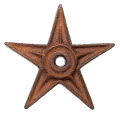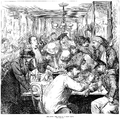|
All these are things I found through research and the like, and restored, or at least prepared and scanned, though some may have been stitched together by others, since I only have an A4 scanner. Of those I didn't scan myself, most are from the Library of Congress
This is not a complete list: I've removed most of my earlier work, which was mostly relatively simple preparation tasks, to highlight my more recent work.
Some of my best work that did not become FP on Commons, but which did on English Wikipedia.
I think these probably should be FPs here, but Featured Picture processes have a certain amount of randomness inherent to them.
Nominations of others' work:
I believe in supporting other people. Here are things I nominated by others that became FP.
My Valued Images[edit]
★ Your nomination has been reviewed and promoted ★Congratulations! The image you nominated was reviewed and has now been promoted as a valued image. It is considered to be the most valued image on Commons within the scope: Shakespeare's Taming of the Shrew. If you would like to nominate another image, please do so at Valued images candidates. review
.svg/15px-Pictogram_voting_comment_(orange).svg.png) Comment Thank you for nominating this fine image. I had a great time reading most parts of the en article on the subject to get a better understanding of the scope. The setup of a drunken person seeing a play in the play reminds me of a delightful Danish play called Jeppe på Bjerget (en:Jeppe of the Hill) written by Ludvig Holberg in 1722. I have some comments for you to address Comment Thank you for nominating this fine image. I had a great time reading most parts of the en article on the subject to get a better understanding of the scope. The setup of a drunken person seeing a play in the play reminds me of a delightful Danish play called Jeppe på Bjerget (en:Jeppe of the Hill) written by Ludvig Holberg in 1722. I have some comments for you to address
- Is the scope unambiguous? The nomination refers to a comedy named The Taming of the Shrew by Shakespeare, but there is another play of the same name from the same period, which this could be confused with. Maybe "...by William Shakespeare" should be appended to the scope?
- Does it illustrate the subject well? Well, personally I am having a hard time understanding exactly what is going on in the image. That may be because I am not so familiar with the piece. Although it is stated which act and scene the image is from I request that the person in the scene are mentioned on the image page as well as a description of what is going on there, see Image:Taming-of-the-Shrew-Gillray.jpeg for example for a much better description on an image page with the same scope.
- What do you think of when thinking about the scope: the manuscript itself (of which there is this image: Image:FirstFolioTamingOfShrew.jpg or the realization of the manuscript in a play)? I actually had the manuscript in mind. Again, a twist to the scope may make it more precise what you have in mind. -- Slaunger (talk) 21:23, 13 August 2008 (UTC)
- Right. Let me be honest, Taming of the Shrew is not a very comfortable play for us modern readers. From Act IV, Scene I:
- My falcon now is sharp and passing empty;
- And till she stoop she must not be full-gorged,
- For then she never looks upon her lure.
- Another way I have to man my haggard,
- To make her come and know her keeper's call,
- That is, to watch her, as we watch these kites
- That bate and beat and will not be obedient.
- She eat no meat to-day, nor none shall eat;
- Last night she slept not, nor to-night she shall not;
- As with the meat, some undeserved fault
- I'll find about the making of the bed;
- And here I'll fling the pillow, there the bolster,
- This way the coverlet, another way the sheets:
- Ay, and amid this hurly I intend
- That all is done in reverend care of her;
- And in conclusion she shall watch all night:
- And if she chance to nod I'll rail and brawl
- And with the clamour keep her still awake.
- This is a way to kill a wife with kindness;
- And thus I'll curb her mad and headstrong humour.
- He that knows better how to tame a shrew,
- Now let him speak: 'tis charity to show.
- What we're seeing here is a continuation of that: Petruchio has just rejected a cap he had ordered for Kate (seen on the ground) over her wishes, because it was not good enough for her, and is now analysing and finding fault with a gown he had ordered for her. It too will soon be rejected, despite Kate's liking for it, until she learns to obey her husband's will. By the end of it, he'll literally have her agreeing the sun is the moon.
- Lovely little play, eh? But it's Shakespeare, so... Anyway, I don't think a reproduction of the folio is actually a better image, and I think this can stand up over a badly-photographed modern reproduction of the first printing any day =) Adam Cuerden (talk) 00:43, 14 August 2008 (UTC)
.svg/15px-Pictogram_voting_comment_(orange).svg.png) Comment Thank you for taking your time to explain this. Regrettably, I do not understand many of the nuances in this old text, but you are not to blame for that. I do understand now, though that the scene selected is very adequate in describing the essence of the play and the process of taming the shrew, and I agree that it is the most valued image on Commons within the scope (which is now also more precise, thank you). Before I support though, I would like to ask you to put your "What we are seeing..." part in the image page such that other users will understand the context as well. -- Slaunger (talk) 19:34, 14 August 2008 (UTC) Comment Thank you for taking your time to explain this. Regrettably, I do not understand many of the nuances in this old text, but you are not to blame for that. I do understand now, though that the scene selected is very adequate in describing the essence of the play and the process of taming the shrew, and I agree that it is the most valued image on Commons within the scope (which is now also more precise, thank you). Before I support though, I would like to ask you to put your "What we are seeing..." part in the image page such that other users will understand the context as well. -- Slaunger (talk) 19:34, 14 August 2008 (UTC)
- Done, though I hope it's not too much explaanation =) Adam Cuerden (talk) 05:01, 15 August 2008 (UTC)
 Support All issues addressed and solved. -- Slaunger (talk) 06:11, 15 August 2008 (UTC) Support All issues addressed and solved. -- Slaunger (talk) 06:11, 15 August 2008 (UTC)
Result: 1 support, 0 oppose =>
Promoted. -- Sfu ( talk) 12:29, 17 August 2008 (UTC)
★ Your nomination has been reviewed and promoted ★Congratulations! The image you nominated was reviewed and has now been promoted as a valued image. It is considered to be the most valued image on Commons within the scope: Childe Harold's Pilgrimage. If you would like to nominate another image, please do so at Valued images candidates. review
 Support Scope ok according to the guidelines, only picture we have, and it is reasonably illustrative of the subject. Categorization needed to be looked at, though. --Eusebius (talk) 07:51, 20 April 2009 (UTC) Support Scope ok according to the guidelines, only picture we have, and it is reasonably illustrative of the subject. Categorization needed to be looked at, though. --Eusebius (talk) 07:51, 20 April 2009 (UTC)
Result: 1 support, 0 oppose =>
promoted. Eusebius (talk) 16:43, 23 April 2009 (UTC)
My Valued Image Sets[edit]
|
















.jpg/87px-Gustave_Doré_-_Dante_Alighieri_-_Inferno_-_Plate_9_(Canto_III_-_Charon).jpg)

.jpg/120px-Gustave_Doré_-_Dante_Alighieri_-_Inferno_-_Plate_65_(Canto_XXXI_-_The_Titans).jpg)





.png/120px-Gasshukoku_suishi_teitoku_kōjōgaki_(Oral_statement_by_the_American_Navy_admiral).png)















.jpg/120px-Edward_Walsh_-_Queenstown%2C_Upper_Canada_on_the_Niagara_(a.k.a._Queenston%2C_Ontario).jpg)



















.jpg/120px-Gustave_Doré_-_Dante_Alighieri_-_Inferno_-_Plate_22_(Canto_VII_-_Hoarders_and_Wasters).jpg)
















